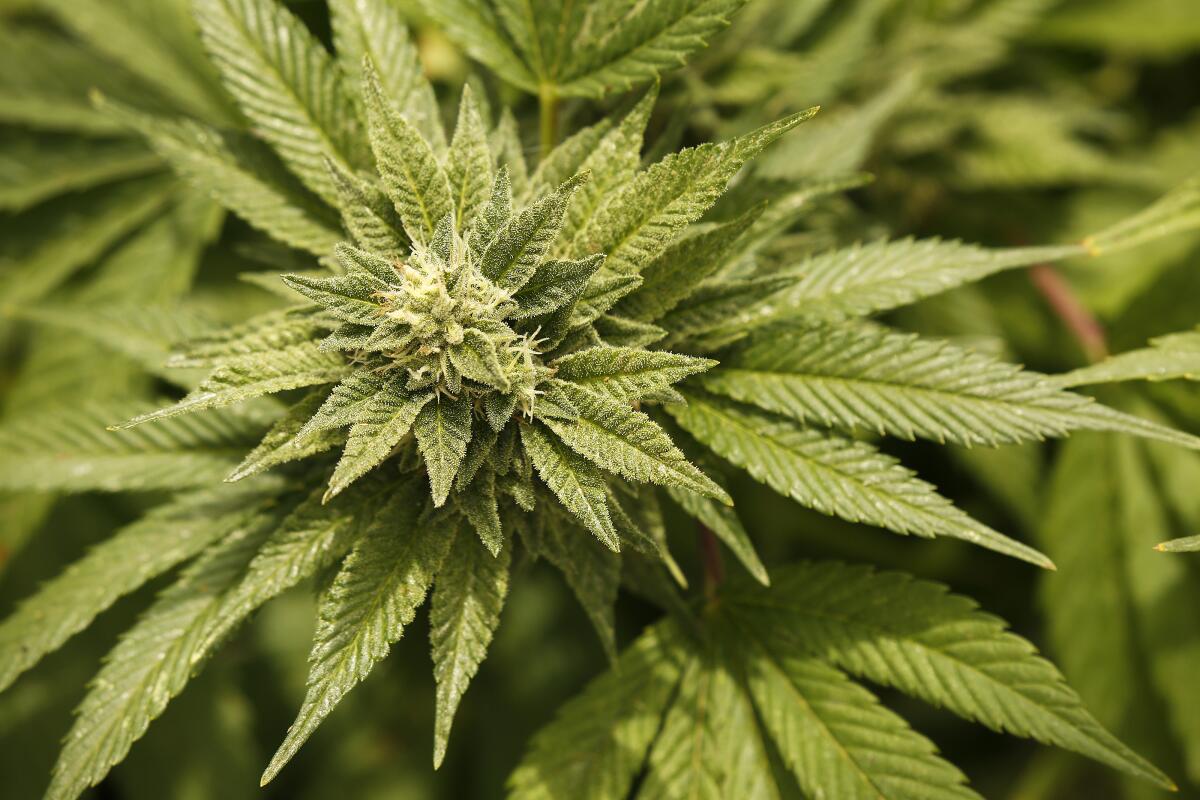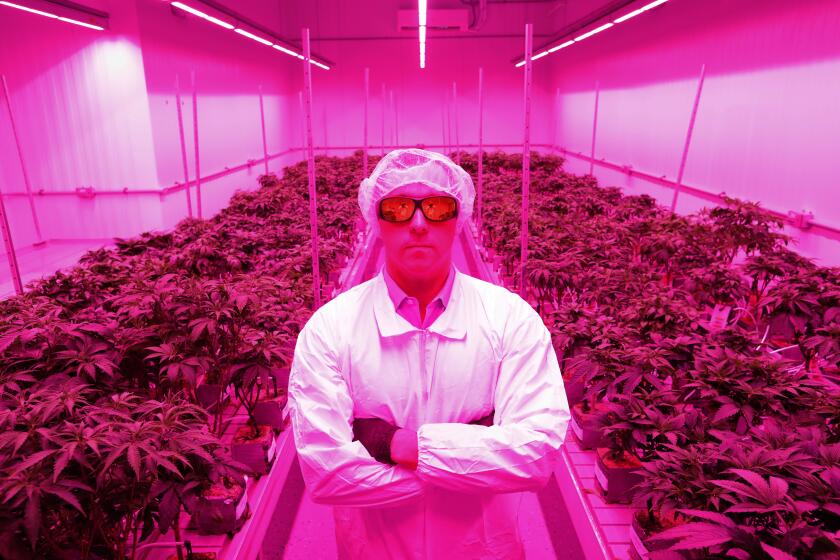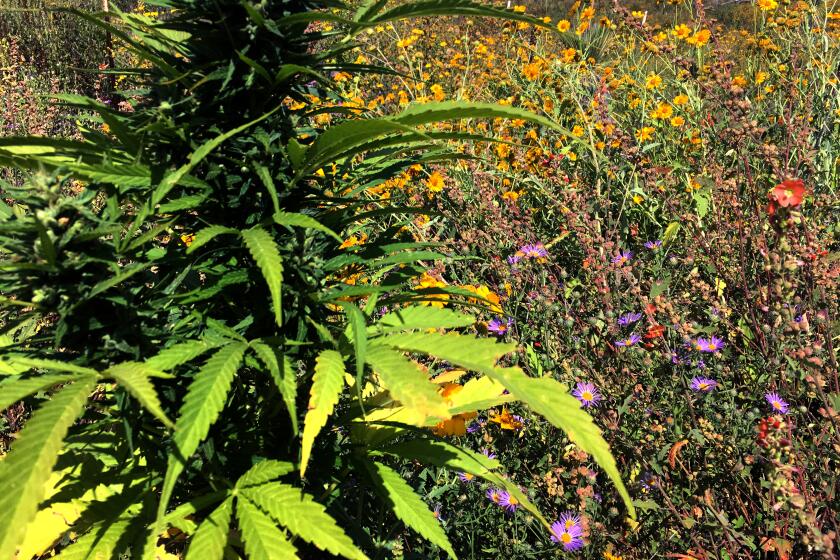Congress says it’s liberalizing pot research laws. What pot researchers really need is money

- Share via
Despite some recent baby steps, the untangling of the federal government’s enduring and preposterous opposition to cannabis as a medicine or recreational substance is going to take a long, long time.
Nevertheless, I was delighted to read that the Senate had recently passed a bipartisan legislation loosening rules about cannabis research, “Cannabidiol and Marihuana Research Expansion Act.” (The strange spelling has an unfortunate historical precedent.)
That is, until I spoke to a well-known cannabis researcher and a couple of attorneys who have sued the federal government on her behalf.
The Senate bill’s co-sponsors Dianne Feinstein (D-Calif.), Chuck Grassley (R-Iowa) and Brian Schatz (D-Hawaii) claim in a press release touting its passage that “this important legislation will cut the red tape around the research process, helping get FDA-approved, marijuana-derived medications safely to patients.”
But critics say the bill would make it more difficult to research some substances of medical interest derived from marijuana. They also say it does not require the feds to issue licenses for research, which means the government could block research, much as it did during the Trump administration when then-Atty. Gen. Jeff Sessions opposed cannabis for any use.
Sue Sisley, a physician and researcher who has dedicated her career to the study of cannabis for veterans suffering with untreatable PTSD, end-stage cancer patients with untreatable pain, and opioid addicts trying to get clean, was not impressed with the new bill.
One of her attorneys, Shane Pennington, was downright furious.
“We don’t need more legislation, we need funding,” Pennington said. “What Sue needs is money. These studies are very expensive, they cost tens of millions of dollars.” (There is no cannabis industry equivalent to Big Pharma, unfortunately, with the deep pockets needed to conduct such testing.)
California legalized medical weed 25 years ago, spurring a nationwide shift. But federal government rules stymie research on marijuana’s potential.
Sisley, founder of the Scottsdale Research Institute, is among a limited number of researchers already permitted by the Drug Enforcement Administration to grow and use cannabis in her research. She is also licensed to research psilocybin, which she is using to treat long COVID patients. So far, she said, patients receiving daily microdoses are reporting “extraordinary benefits” with regard to brain fog and low energy.
Until recently, Sisley was required to use cannabis from what was for years the only federally approved cannabis grower, the University of Mississippi’s marijuana research program.
Although the crop out of Mississippi has defenders, many researchers say it’s awful, with low potency, few flowers and lots of stems and leaves. Sisley said when the veterans she was working with smoked or vaped it, their throats and lungs hurt before they could ever get high.
“The issue for us has always been, the study drug we received from government was so anemic, diluted, moldy, it had no chance of beating placebos,” she told me. “[The subjects] can never reach a therapeutic threshold with it.”
After filing a lawsuit against the DEA and Department of Justice — “Good medical marijuana science isn’t generated by sub-par weed,” her attorneys wrote — Sisley won the right to grow her own.
Limiting commercial hemp to just 0.3% THC is unworkable. Raise it to 1%. No one is smoking 1% hemp to get high.
The cannabis she grows now, she said, is high quality. She is allowed to provide it to researchers with Schedule 1 licenses, such as a scientist at Yale who is conducting a study of the effect of cannabis on brain health.
Sisley and Pennington told me the law the Senate passed would make cannabidiol, or CBD — a non-psychoactive chemical in the cannabis plant that has been shown to be effective in treating intractable epilepsy — more difficult to research. Currently CBD is not a controlled substance; the Feinstein bill would treat it as such for research purposes, or at least require researchers to have Schedule 1 licenses.
“Right now,” said Pennington, “anyone can research CBD even without registering with the DEA.” The new bill, he said, “imposes the DEA-registration requirements on CBD researchers. That is a heavy regulatory burden.”
Feinstein, through a staffer, disagreed with that interpretation, which comes down to the way the bill defines the chemical makeup of CBD.
Delving into the various, conflicting laws and rules about cannabis can feel like getting lost in a maze. Although it is legal for medical use in 39 states and for recreational use in 18, the federal government continues to regard it as a dangerous drug with no currently accepted medical use and a high potential for abuse. For Washington’s purposes, marijuana is classified with heroin and LSD.
Editorial: Californians overwhelmingly supported legalizing marijuana. Why is it still a mess?
The promise of Proposition 64 remains largely unfulfilled five years after passage. California is an example of how not to legalize marijuana.
But as with epilepsy, there are accepted medical uses of cannabis. Igor Grant, a UC San Diego psychiatrist who directs the school’s Center for Medicinal Cannabis Research, told me that in 2017, the National Academies of Sciences issued a report outlining various known medical benefits of many cannabis-derived substances.
While many consider marijuana a “gateway drug,” more and more experts are thinking of it as an “offramp” or “exit” drug, something that can help people addicted to opioids get off the deadly narcotic, and stay off, as it appears to help relieve the kind of chronic pain that causes addiction in the first place.
If Congress is really interested in promoting research into how cannabis can improve people’s lives, it must find the courage to once and for all reclassify it.
The House has already done so, passing a bill that would legalize cannabis at the federal level and explicitly give states the right to regulate it. New Jersey Democratic Sen. Cory Booker has said he will introduce similar legislation in the Senate.
Should these bills become law, the banking impediments that have caused nightmares for cannabis entrepreneurs would also disappear.
It would signal a new day, long overdue, for cannabis, and the many Americans whose lives it improves.
More to Read
A cure for the common opinion
Get thought-provoking perspectives with our weekly newsletter.
You may occasionally receive promotional content from the Los Angeles Times.














